By HAL BERNTON, Seattle Times
WWII German POW returns to say Thanks – Intermission Story (27)
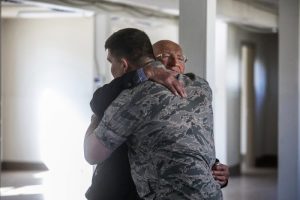
In an Oct. 3, 2017 photo, Günter Gräwe, a German POW held in Washington during World War II, bids farewell as he finishes touring a former barracks with Deputy Joint Base Commander Col. William Percival at Joint Base Lewis-McChord. (Steve Ringman/The Seattle Times via AP)
SEATTLE (AP) — Gunter Grawe spent three years as a German prisoner of war in western Washington, a World War II incarceration he recalls not with rancor, but gratitude for the chance to “live and learn in America.” Grawe always thought about returning to the state to say thank you.
In early October, the rail-thin veteran, now 91, did just that during a brief visit to this base, where guard towers and barbed-wire fences are long gone but some of the two-story wooden barracks that once housed German prisoners still stand.
He declared his capture by the Americans at the age of 18 “his luckiest day,” and reminisced about camp life that included English, French and Spanish classes organized by other POWs and a commissary stocked with chocolate, ice cream and Coca-Cola.
“I never had anything to complain about,” Grawe said. “No guard called us nasty names. I had a better life as a prisoner than my mother and sister back home in Germany.”
In a global conflict that resulted in the deaths of more than 60?million people — including 6?million Jewish Holocaust victims — Grawe was indeed fortunate to live to an old age denied so many others. Grawe was filled with patriotism as he went to serve in the German army but now denounces Adolf Hitler as “one arrogant, hypocritical dammed liar” who led his nation into disaster and shame.
Grawe’s trip to Joint Base Lewis-McChord was arranged with the help of HistoryLink.org, a Seattle-based online encyclopedia that chronicles the state’s past. “We have a list of those who were pro-Nazi, and he was not on it,” said Duane Denfield, a historian who works as a JBLM contractor.
Grawe’s military career started in Latvia, where he went through training for what appeared to be an assignment to the Eastern Front to fight a resurgent Russian army. If Josef Stalin’s forces had captured him, he likely would have been sent to a labor camp, where harsh conditions killed many.
But then Allied forces invaded France, and the Germans scrambled to try to slow their advance toward Paris with fresh reinforcements. Grawe was transferred to Normandy, where he served in a tank unit that was quickly overwhelmed by the U.S. and British armies.
“It was a terrible fight in Normandy — it wasn’t what we expected, and we were young and inexperienced,” Grawe said.
Grawe said he realized how well things had turned out as he was put on the ocean liner Queen Mary for the voyage to America. He had comfortable quarters and most important — ample meals — served on metal trays. Next, he took a train ride across America to what was then Fort Lewis. At the Army post south of Tacoma, barracks vacated by U.S. troops were turned into prison quarters for some 4,000 German POWs at five locations.
Fort Lewis (now part of the joint base) was part of a much broader POW prison-camp network of some 500 sites across the country that held 400,000 Germans. Overall, historians say these prisoners were treated well. Some Germans even referred to their camp as a “golden cage,” according to Michael Farquhar, who wrote a 1997 article about the POWs for The Washington Post.
Grawe traveled by truck from Fort Lewis to help in apple, sugar-beet and potato harvests. Later, he was transferred to Arizona to bring in cotton. He recalled his farm labor as a real adventure that earned him an 80-cents-a-day salary to buy things at the commissary.
Through his years as a prisoner, Grawe says he came to love America.
But his first loyalties were to Germany. As a boy, he participated in Hitler Youth. He joined the army as what he calls a “young idealistic soldier” who thought it “right to fight for an honest and upright fatherland” just like his father, a plumber turned soldier who died in the war in 1940.
Grawe says he first learned of the horrors of the Nazi concentration camps while a prisoner in America. He initially brushed off the news as propaganda because it was conveyed by a U.S. officer. When he wrote home to his mother and sister, they replied it was true.
In 1947, two years after Germany’s unconditional surrender, Grawe was released. In the postwar era, as the German economy surged, Grawe prospered. Through the decades, he returned to the U.S. several times to vacation. But only after his wife died in 2016 did he make up his mind to return to Washington state.
On Oct. 3, a brilliant fall day, Grawe arrived at JBLM. He brought his electric bike, determined to ride the final distance — a little over a mile — to the old camp site. On each side of his bike’s rear wheel hung a sign: “USA, the country and its people, you are my first and final love!”
At the blacktop by the barracks, he looked around somewhat uncertainly. He recalled a barren site. This place was full of fir trees that had grown up in the seven decades since the prisoners had gone home.
He was greeted by the base’s deputy joint commander, Col. William Percival, who offered a handshake, and later a hug inside a building now empty and bare of furniture.
He piled his plate full of a noodle casserole, and sat down to eat one more ample meal served up by the U.S. Army. This time, as a free man.
Click on images to enlarge.
####################################################################################
Military Humor – by: Bill Mauldin 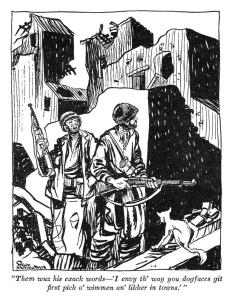
####################################################################################
Farewell Salutes –
Michael Aiello – St. Louis, MO; US Army, WWII, SSgt., KIA
Robert Blakeley – Jacksonville, FL; USMC
Vincent Burns – Athol, MA; US Army Air Corps, WWII, ETO
Richard Cavazos – San Antonio, TX; US Army, Vietnam, BGeneral
Walter Hackenberg – Middleburg, PA; US Army, Korea, POW, KIA
Duane Hackney – Flint, MI; US Air Force, Vietnam, (most decorated airman in U.S. history)
Charlie Laine – Broad Channel, NY; US Navy, WWII
David McElroy – Brookline, MA; US Coast Guard, WWII, Yeoman
William Parham – Bedford, IN; US Navy, WWII, PTO
Jacob Sims – OK & Juneau, AK; US Army, Afghanistan, Chief Warrant Officer, KIA
#####################################################################################
Posted on November 6, 2017, in Current News, Home Front, Uncategorized, WWII and tagged 1940's, ETO, German POW, History, Military, Military History, veterans, Washingtom State, WW2, WWII. Bookmark the permalink. 176 Comments.
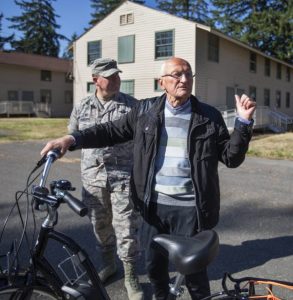
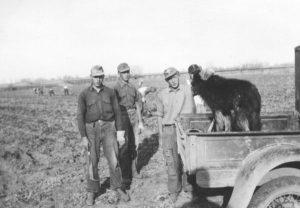
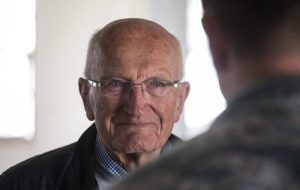
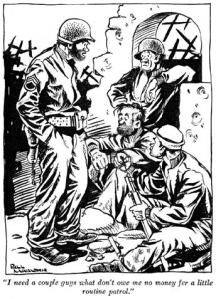







Reblogged this on John's Notes and commented:
I reposted from GP Cox’s blog yesterday () about one German POW came in the US. This short article is about a German POW who spent three years in a Washington state POW camp.
LikeLiked by 1 person
Thank you very much, John.
LikeLike
Outstanding story. Thanks for pointing me to it.
LikeLiked by 1 person
Anytime!
LikeLike
Is this ever cool. For 5 years I lived about 45 minutes from Ft. Lewis, I knew soldiers who were stationed there but I never knew that it was a POW camp. Man do I ever enjoy your posts!
LikeLiked by 1 person
I’m encouraged by hearing that, Kevin. Thank you very much!
LikeLike
I share some of your stories with a friend of mine interested in WWII. 🙂
LikeLiked by 1 person
How very nice of you, I do hope they find them interesting!
LikeLike
GP, Nice that you reblogged this touching story!!! Looking around, you have been diversifying your posts of recent! –Very nice! And thanks for the “Like” on my recent website post on a recipe……You put me to shame!…..Just doing my thing! Be well! Phil
LikeLiked by 1 person
Enjoying your own life and doing what makes you and your family happy is priority ONE. I appreciate your visits and (psst) I cook around here quite a bit, so I need some new recipes.
LikeLiked by 1 person
Wat een geweldig verhaal weer.
LikeLiked by 1 person
Thank you very much!
LikeLike
Amazing story. During WWI, my grandfather was captured by the Germans. He said it saved his life
LikeLiked by 1 person
I wish I could hear more of the his story.
LikeLiked by 1 person
I’m using a tablet at the moment. Waiting for a new laptop after I killed the screen on the old one. When I have a real keyboard I’ll send more info
LikeLiked by 1 person
Thank you.
LikeLike
Really interesting to hear this perspective. And I always love the comics you manage to find!
LikeLiked by 1 person
Thanks for reading this, Anna.
Sometimes I’m forced to repeat the comics, but the military is always coming up with new ones for me to find – love their sense of humor.
LikeLiked by 1 person
Magnificent story gp, age gets to all soldiers sooner or later, and it’s great to see their reminiscences of long bygone days of turmoil in their War memories.
LikeLiked by 1 person
Thank you, Ian. I thought I’d show the ranters that the US isn’t all bad, and the enemy were human also.
LikeLiked by 1 person
Excellent post, GP – it shows us again that most of the “common” soldiers in any army aren’t so different from our own … the problems originated with fanatical “leaders” such as Hitler or the Japanese military general staff …
LikeLiked by 1 person
Exactly. One day (I hope.) wars will be fought by the fanatics who have the problem in the first place!
LikeLike
That was a beautiful story of Grawe. I am fascinated by the kind of emotions and stories that would roll out of such veterans. Happy Veterans’ Day!
LikeLiked by 1 person
It shows the human side of what was once the enemy.
LikeLiked by 1 person
It is surprising when you do hear the stories from the other side, is it not? It touches you and you start wondering that it is after all war and it can only yield heartbreak on both sides.
LikeLiked by 1 person
Too true.
LikeLike
What a stark contrast between the way German prisoners of war were treated here and the treatment accorded Allied prisoners of war in the Philippines and elsewhere in the Pacific. Unbelievable!
LikeLike
Yes, the prisoners in the Pacific had no Geneva Convention to back them up either, our POW’s in Germany fared much better than them.
LikeLike
We had a prisoner of war camp in Sherbrooke, Quebec. My mother was one of the persons who entertained them. She was a singer. They were happy safe here. The irony is precious. Best.
LikeLiked by 1 person
Thank you very much for your story, Micheline. In the past I did a post showing that Canada had POW camps and so many people were surprised to hear that you did.
LikeLike
I was wondering is your would be interested in submitting another story to Volume II of Soldiers’ Stories: A Collection of WWII Memoirs? Many people don’t know the POW side of the war… this is a great one! Or, any others of your choice! I have collected over 130 so far, my limit is 150. Thanks for your blog… I love it!
Myra Miller
LikeLiked by 2 people
How wonderful to hear from you again, Myra. This article, as you can see was not written by me and I do not know any former POW’s personally – does that matter? I am in contact with the former editor of the “Voice of the Angels” for the 11th Airborne Division Assoc., perhaps he has one or how about one about a combat chaplain or another funny one from my father? I’d be honored to contribute.
LikeLiked by 2 people
Yes, another funny one about your father would be perfect!!!!
LikeLiked by 2 people
I’ll get right on it.
LikeLiked by 1 person
What a great story, GP! 🙂
LikeLiked by 1 person
Thank you, Linda, much appreciated.
LikeLiked by 1 person
Thank you very much for linking this post on your list.
LikeLike
Your sharing is much appreciated.
LikeLike
Pingback: FEATURED BLOGGER REPORT: Home Front – Big Timber, Montana By Pacific Paratrooper #AceHistoryDesk rep orts | ' Ace Worldwide History '
Pingback: The Weekly Headlines – My Daily Musing